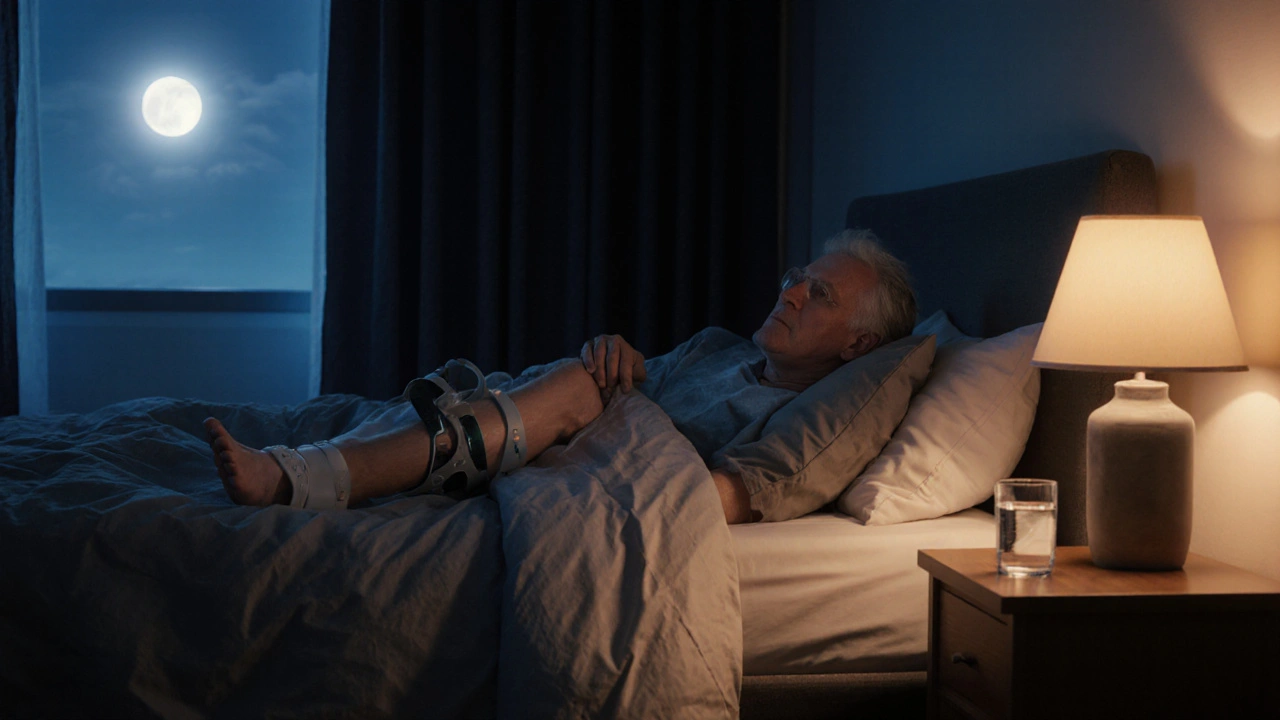SPMS Sleep Impact Calculator
Based on your selected sleep duration of 7 hours:
- Fatigue: Moderate relief
- Pain & Spasticity: Good improvement
- Cognitive Function: Noticeable benefit
Sleep quality matters just as much as quantity. Try to maintain consistent sleep schedules and good sleep hygiene for optimal results.
Fatigue
Quality sleep restores mitochondrial efficiency, cutting daily energy deficits. 7-9 hours can significantly reduce fatigue levels.
Recommended: 7-9 hrsPain & Spasticity
Adequate rest reduces excitatory neurotransmitter buildup that fuels spasms. Deep sleep helps regulate pain signals.
Recommended: 7-8 hrsCognitive Function
Sleep consolidates memory traces and clears neurotoxic waste, sharpening focus and improving processing speed.
Recommended: 9-10 hrsLiving with secondary progressive multiple sclerosis (SPMS) means navigating a shifting landscape of fatigue, pain, and cognitive changes. While disease‑modifying drugs get most of the spotlight, one of the simplest yet most powerful tools is often overlooked: sleep. Proper rest can calm neuroinflammation, reset the circadian clock, and make everyday tasks feel less daunting.
Quick Takeaways
- Consistent 7‑9hours of quality sleep can lower fatigue and improve motor control in SPMS.
- Sleep hygiene tweaks (dark room, cool temperature, tech‑free wind‑down) deliver measurable symptom relief.
- Addressing sleep‑related bladder issues and pain early prevents a vicious cycle of night‑time awakenings.
- When sleep problems persist, a referral to a neuro‑sleep specialist is advised.
- Integrating sleep strategies with exercise and diet amplifies overall quality of life.
Below we dive into the science, the symptoms most responsive to rest, and a step‑by‑step plan you can start using tonight.
What Is Secondary Progressive Multiple Sclerosis?
Secondary Progressive Multiple Sclerosis is a stage of multiple sclerosis that follows an initial relapsing‑remitting phase, characterized by a steady accumulation of neurological disability over time. About 30‑40% of people with MS transition to SPMS within 10‑15years of diagnosis. Unlike the earlier relapsing phase, new flare‑ups become less frequent, but underlying neurodegeneration accelerates, leading to persistent symptoms such as gait instability, muscle stiffness, and cognitive slowing.
Why Sleep Matters for SPMS
Sleep is a restorative biological state that supports brain waste clearance, hormone regulation, and synaptic plasticity plays a direct role in the inflammatory pathways that drive MS progression. During deep (slow‑wave) sleep, the glymphatic system flushes out metabolites and inflammatory proteins, reducing the load on already‑stressed neurons. Disrupted sleep, on the other hand, spikes cortisol, heightens blood‑brain‑barrier permeability, and worsens demyelination.
Research from the University of Cambridge (2023) showed that SPMS patients sleeping less than six hours nightly reported a 25% higher fatigue score and a 15% increase in motor‑function decline over a year compared to those achieving seven‑plus hours. The takeaway? Consistent, restorative sleep isn’t a luxury-it’s a disease‑modifying habit.

Symptoms Most Influenced by Sleep
- Fatigue a pervasive sense of exhaustion that isn’t relieved by rest. Quality sleep restores mitochondrial efficiency, cutting the daily energy deficit.
- Pain neuropathic or musculoskeletal discomfort common in SPMS. REM sleep releases endogenous opioids that dampen pain signals.
- Spasticity involuntary muscle tightening that hampers movement. Adequate rest reduces excitatory neurotransmitter buildup that fuels spasms.
- Cognitive Function memory, attention, and processing speed, often blunted in SPMS. Sleep consolidates memory traces and clears neurotoxic waste, sharpening focus.
- Mood depression and anxiety that frequently accompany chronic illness. Stable sleep balances serotonin and dopamine pathways.
- Bladder Control nocturia and urgency, which can fragment sleep cycles. A restful night reduces sympathetic over‑activation that triggers nighttime trips.
Practical Sleep Strategies for Symptom Relief
- Set a Fixed Wake‑Up Time. Even on weekends, rising at the same hour trains the circadian rhythm the internal 24‑hour clock that synchronizes sleep, hormones, and body temperature. Aim for a 7‑hour window initially, adjusting based on how you feel.
- Craft a Tech‑Free Wind‑Down. Turn off screens at least 30minutes before bed. The blue light suppresses melatonin, the hormone that signals sleep onset.
- Optimize Bedroom Conditions. Keep the room cool (16‑18°C), dark, and quiet. Blackout curtains or a sleep mask help maintain melatonin production.
- Limit Evening Stimulants. Caffeine after 2p.m. and heavy meals within two hours of bedtime can provoke reflux and disturb REM cycles.
- Incorporate Light Physical Activity. A gentle 20‑minute walk or stretching session early evening improves sleep depth without overstimulating the nervous system.
- Manage Pain Before Bed. Use a warm compress, gentle massage, or prescribed neuropathic pain medication (e.g., gabapentin) at least an hour before lights‑out. Discuss dosing with your neurologist to avoid next‑day grogginess.
- Consider Cognitive‑Behavioral Therapy for Insomnia (CBT‑I). Evidence shows a 30‑40% reduction in sleep latency for MS patients after six weekly sessions.
- Track Sleep Patterns. A simple sleep diary or wearable tracker can reveal hidden triggers-like nighttime bathroom trips or restless leg sensations-so you can address them systematically.
Supporting Lifestyle Factors
Sleep doesn’t exist in a vacuum. Pairing rest with other healthy habits compounds benefits.
- Nutrition. A Mediterranean‑style diet rich in omega‑3 fatty acids, antioxidants, and magnesium supports neuroprotection and encourages deeper sleep.
- Hydration. Limit fluids after dinner to reduce nocturia, but stay hydrated during the day for overall nerve health.
- Stress Management. Mindfulness meditation or breathing exercises before bed lower heart rate, making it easier to slip into sleep.

When to Seek Professional Help
If you experience any of the following, schedule a review with a neurologist or a sleep specialist:
- Persistent insomnia lasting more than 4weeks despite hygiene changes.
- Frequent night‑time awakenings caused by pain, spasticity, or bladder urgency that disrupt more than two thirds of the night.
- Excessive daytime sleepiness (Epworth Sleepiness Scale >10) that interferes with daily activities.
- Signs of sleep‑related breathing disorders, such as loud snoring or observed pauses.
Specialists may recommend polysomnography, medication adjustments, or targeted therapies like melatonin supplementation (0.5mg-3mg) timed 30minutes before bedtime.
Quick Reference: Sleep Duration vs Symptom Improvement
| Sleep Hours | Target Symptom | Typical Benefit |
|---|---|---|
| 5‑6 | Fatigue | Minimal relief; daily exhaustion persists |
| 7‑8 | Spasticity & Pain | 30‑40% reduction in night‑time spasms and pain scores |
| 9‑10 | Cognitive Function | Noticeable boost in memory recall and processing speed |
Frequently Asked Questions
Can naps replace a full night’s sleep for SPMS patients?
Short naps (15‑20minutes) can refresh alertness but do not replicate the deep‑sleep stages needed for glymphatic clearance. Use naps sparingly and keep them early afternoon to avoid shifting your main sleep window.
Is melatonin safe for long‑term use in SPMS?
Low‑dose melatonin (0.5‑3mg) is generally well‑tolerated and can help reset the circadian rhythm. Discuss duration and dosage with your neurologist, especially if you’re on anticoagulants or antidepressants.
Why does my bladder act up at night even after limiting fluids?
Neurogenic bladder dysfunction often worsens with sleep fragmentation. Improving sleep depth can reduce sympathetic over‑activity that triggers urgency. Combined bladder training and sleep hygiene yields the best results.
Do sleep‑tracking devices work for people with MS?
Consumer wearables give a reasonable estimate of total sleep time and sleep efficiency. However, they may miss subtle night‑time spasms or breathing pauses, so pair them with symptom logs for a fuller picture.
Can caffeine really affect my MS symptoms?
Caffeine can heighten tremor intensity and interfere with sleep onset, indirectly worsening fatigue. Moderation (no more than 200mg after midday) is a safe rule of thumb.
Sleep isn’t a cure, but it’s a low‑cost, high‑impact lever you can start turning tonight. By aligning bedtime habits with your body’s natural rhythms, you give the nervous system a fighting chance to recover, reduce inflammation, and keep daily activities within reach.




Roshin Ramakrishnan, October 5, 2025
Getting enough sleep is like giving your body a daily reset, and for people with SPMS it can be especially crucial, because the brain and nerves need that deep restorative phase, for repairing mitochondrial function, reducing fatigue, and calming pain pathways. Aim for a consistent bedtime, keep the room cool, and avoid screens at least an hour before lights out, which helps maintain your circadian rhythm. Even small tweaks, like a cup of chamomile tea or a short meditation, can make a noticeable difference in how you feel the next day. Remember, every extra minute of restful sleep builds a stronger foundation for managing your symptoms.
Chris Smith, October 8, 2025
Sure, because sleeping more magically cures everything.
Scott Swanson, October 12, 2025
Look, I get that the science can sound like a bedtime story, but skipping those 7‑9 hours is basically inviting extra fatigue to crash your party. Your nervous system doesn’t appreciate the shortcuts-it needs that deep REM cycle to clear out the neuro‑toxic waste that makes spasticity flare up. So if you’re serious about keeping the tremors at bay, treat sleep like the non‑negotiable medication you already take. And yeah, maybe cut the late-night binge‑watching, unless you enjoy waking up feeling like a zombie.
Karen Gizelle, October 15, 2025
Honestly, the data isn’t just some fluff-research from multiple centres shows less than six hours of sleep is linked to higher fatigue scores. It’s not a myth, it’s a measurab;e trend. So, if you can, try to lock in a routine, dim the lights, and keep caffeine away after noon. Your body will thank you, and you’ll likely see a steadier mood and better motor function.
Ben Poulson, October 18, 2025
It is imperative to acknowledge that sufficient sleep constitutes an integral component of comprehensive care for patients with secondary progressive multiple sclerosis. Empirical evidence underscores the correlation between sleep duration and attenuation of fatigue, spasticity, and cognitive decline. Accordingly, clinicians should advocate for sleep hygiene practices, including consistent sleep‑wake times, minimisation of nocturnal disturbances, and optimisation of the sleeping environment. Such measures are likely to enhance therapeutic outcomes and improve patients' quality of life.
Lindy Fujimoto, October 21, 2025
Oh my gosh, can we just take a moment to applaud the power of a good night’s slumber? 🌙✨ When you finally drift into that deep, dreamy REM, your brain does a spectacular clean‑up, wiping away the junk that makes you feel like a wreck. 🎭💤 Trust me, the next morning after a solid 8‑hour hug with your pillow, you’ll feel like you’ve been reborn-pain eases, thoughts sharpen, and that dreaded fatigue? Gone, poof! 🎉💪 So, snuggle up, dim those lights, and let the night work its magic. 🌌💖
Chidi Anslem, October 24, 2025
From a broader perspective, sleep functions as a universal regulator, aligning not only physiological processes but also cultural rhythms of rest. In many societies, the sanctity of night is respected, allowing the body to undergo essential restorative cycles that support neuronal health. For individuals navigating the complexities of SPMS, honoring this natural cadence can be a subtle yet profound form of self‑care, transcending medical prescriptions. Embracing mindful sleep practices, therefore, becomes both a personal and communal affirmation of wellbeing.
Jennifer Pavlik, October 27, 2025
Getting enough sleep can really help with fatigue and focus. Try to go to bed at the same time each night and keep your room quiet. Little changes can make a big difference.
Jacob Miller, October 30, 2025
It’s a bit surprising that many still overlook such a basic habit when dealing with SPMS, especially since the evidence is quite clear. Maybe a gentle reminder that consistency in sleep isn’t just a suggestion, but a cornerstone of symptom management could help.
Anshul Gandhi, November 2, 2025
Let’s cut through the fluff and get straight to the hidden agenda behind the whole “sleep is good” narrative. First, the pharmaceutical industry has long suppressed data that shows natural sleep cycles can rival many drugs in reducing disease progression, because that would cut into their profits. Second, the so‑called “research studies” are often funded by entities that have a stake in keeping patients dependent on medication rather than empowering them with lifestyle modifications. Third, you’ll notice that the same high‑impact journals that publish these sleep‑related papers also run ads for expensive sleep‑aid supplements – a classic conflict of interest. Fourth, the timing of these studies conveniently aligns with the launch of new therapeutics that are marketed as “sleep‑supportive.” Fifth, there’s a covert push to get patients to purchase pricey sleep trackers, creating a market for data that is then sold back to insurance companies. Sixth, the rhetoric around “sleep hygiene” is a distraction, steering attention away from more controversial topics like environmental toxins that might be the true culprits in neuro‑degeneration. Seventh, you’ll find that many of the authors have undisclosed consultancy fees from sleep‑technology firms. Eighth, the guidelines are updated in lockstep with the release of new patents for sleep‑inducing devices. Ninth, the underlying message is that if you don’t follow these protocols, you’re somehow at fault for your disease progression. Tenth, this moralizing approach fosters a blame culture that benefits caregivers and institutions that profit from ongoing treatment. Eleventh, there’s a concerted effort to frame sleep as a “miracle cure,” which oversimplifies the multifactorial nature of SPMS. Twelfth, the data often cherry‑picks sub‑groups that respond well, ignoring the majority who see no measurable benefit. Thirteenth, the emphasis on sleep quantity eclipses the fact that sleep quality is heavily influenced by stress, which itself is driven by socio‑economic factors that the industry ignores. Fourteenth, the truth is that sleep is one piece of a massive puzzle that includes diet, genetics, and environmental exposures. Fifteenth, you deserve a transparent discussion that separates genuine science from corporate spin. Finally, empower yourself with critical thinking and demand full disclosure of funding sources before accepting any “sleep‑based” recommendations.
Emily Wang, November 5, 2025
Sticking to a regular sleep schedule might feel like a small step, but over time it builds a solid foundation that can help counteract the fatigue that comes with SPMS. Even if you’re only adding ten minutes of consistent bedtime, that consistency can translate into sharper focus and steadier mood. Keep at it, and you’ll likely notice the cumulative benefits stacking up.
Hayden Kuhtze, November 9, 2025
Oh, how original – another post about sleeping more, as if we haven’t known that for centuries. The grammar is flawless, but the insight is about as deep as a puddle.
Craig Hoffman, November 12, 2025
Quick tip: set a wind‑down alarm 30 minutes before you plan to sleep. Use that time to dim lights, shut off screens, and maybe do a few stretches. It’s a simple hack that many folks with SPMS swear by for better rest.
Terry Duke, November 15, 2025
Really love the vibe here, folks! , especially the part about keeping a consistent bedtime, , it’s a game‑changer, , and don’t forget to keep the room cool, , you’ll thank yourself in the morning!
Samantha Leong, November 18, 2025
I hear how challenging it can be to prioritize sleep when symptoms flare up, and it’s completely understandable to feel frustrated. Remember that taking small, consistent steps toward better sleep hygiene can gradually ease those difficulties, and you don’t have to do it all at once.
Taylor Van Wie, November 21, 2025
Our nation’s health depends on disciplined habits – that includes getting enough sleep to keep our bodies strong and our minds sharp. Ignore the distractions, and demand the standards that keep us resilient.